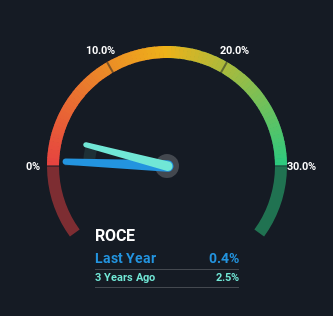These Return Metrics Don't Make Parkson Retail Group (HKG:3368) Look Too Strong

When we're researching a company, it's sometimes hard to find the warning signs, but there are some financial metrics that can help spot trouble early. More often than not, we'll see a declining return on capital employed (ROCE) and a declining amount of capital employed. Trends like this ultimately mean the business is reducing its investments and also earning less on what it has invested. So after glancing at the trends within Parkson Retail Group (HKG:3368), we weren't too hopeful.
What Is Return On Capital Employed (ROCE)?
For those that aren't sure what ROCE is, it measures the amount of pre-tax profits a company can generate from the capital employed in its business. To calculate this metric for Parkson Retail Group, this is the formula:
Return on Capital Employed = Earnings Before Interest and Tax (EBIT) ÷ (Total Assets - Current Liabilities)
0.0042 = CN¥35m ÷ (CN¥11b - CN¥2.9b) (Based on the trailing twelve months to March 2023).
Therefore, Parkson Retail Group has an ROCE of 0.4%. Ultimately, that's a low return and it under-performs the Multiline Retail industry average of 5.1%.
View our latest analysis for Parkson Retail Group

While the past is not representative of the future, it can be helpful to know how a company has performed historically, which is why we have this chart above. If you're interested in investigating Parkson Retail Group's past further, check out this free graph of past earnings, revenue and cash flow.
What Can We Tell From Parkson Retail Group's ROCE Trend?
There is reason to be cautious about Parkson Retail Group, given the returns are trending downwards. To be more specific, the ROCE was 1.8% five years ago, but since then it has dropped noticeably. On top of that, it's worth noting that the amount of capital employed within the business has remained relatively steady. This combination can be indicative of a mature business that still has areas to deploy capital, but the returns received aren't as high due potentially to new competition or smaller margins. If these trends continue, we wouldn't expect Parkson Retail Group to turn into a multi-bagger.
On a related note, Parkson Retail Group has decreased its current liabilities to 25% of total assets. That could partly explain why the ROCE has dropped. Effectively this means their suppliers or short-term creditors are funding less of the business, which reduces some elements of risk. Since the business is basically funding more of its operations with it's own money, you could argue this has made the business less efficient at generating ROCE.
What We Can Learn From Parkson Retail Group's ROCE
All in all, the lower returns from the same amount of capital employed aren't exactly signs of a compounding machine. This could explain why the stock has sunk a total of 85% in the last five years. That being the case, unless the underlying trends revert to a more positive trajectory, we'd consider looking elsewhere.
On a final note, we found 3 warning signs for Parkson Retail Group (1 is a bit concerning) you should be aware of.
For those who like to invest in solid companies, check out this free list of companies with solid balance sheets and high returns on equity.
New: Manage All Your Stock Portfolios in One Place
We've created the ultimate portfolio companion for stock investors, and it's free.
• Connect an unlimited number of Portfolios and see your total in one currency
• Be alerted to new Warning Signs or Risks via email or mobile
• Track the Fair Value of your stocks
Have feedback on this article? Concerned about the content? Get in touch with us directly. Alternatively, email editorial-team (at) simplywallst.com.
This article by Simply Wall St is general in nature. We provide commentary based on historical data and analyst forecasts only using an unbiased methodology and our articles are not intended to be financial advice. It does not constitute a recommendation to buy or sell any stock, and does not take account of your objectives, or your financial situation. We aim to bring you long-term focused analysis driven by fundamental data. Note that our analysis may not factor in the latest price-sensitive company announcements or qualitative material. Simply Wall St has no position in any stocks mentioned.
About SEHK:3368
Parkson Retail Group
Operates and manages a network of department stores, shopping malls, outlets, and supermarkets in the People’s Republic of China.
Good value with mediocre balance sheet.
Similar Companies
Market Insights
Community Narratives




